一般疑问句和否定句
小学英语四种基本句型-肯定句、否定句、一般疑问句与特殊疑问句
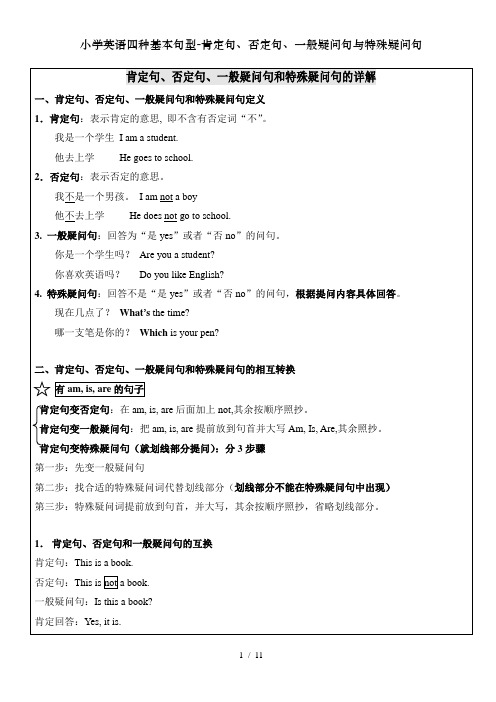
3 / 11
小学英语四种基本句型-肯定句、否定句、一般疑问句与特殊疑问句 特殊:
1.some 变为 any There are some birds in the tree.→There aren't any birds in the tree. 但是,若在表示请邀请、请求的句子中,some 可以不变。 Would you like some orange juice? 与此相关的一些不定代词如 something, somebody 等也要进行相应变化。
2.就划线部分提问(变特殊疑问句) I like English. 第一步:先变一般疑问句 Do you like English? 第二步:找合适的特殊疑问词代替划线部分 Do you like what? 第三步:特殊疑问词提前放到句首,并大写,其余按顺序照抄,省略划线部分。 What do you like?
类别 陈述句
疑问句
用法
标点
肯定 叙述一件事情或 说明说话人的看法 .
否定
一般 用于提出问题
?
特殊 用于提出问题
?
例句 This is a bag. That's my book. I can see a bag over there. I don't know. Are you a student? Do you like puppets? Can you speak English? What's your name? Where's my bag? How many trees are there?
1. 肯定句、否定句和一般疑问句的互换 肯定句:This is a book. 否定句:This is not a book. 一般疑问句:Is this a book? 肯定回答:Yes, it is.
一般疑问句,否定句,肯定、否定回答,选择疑问句(新概念)
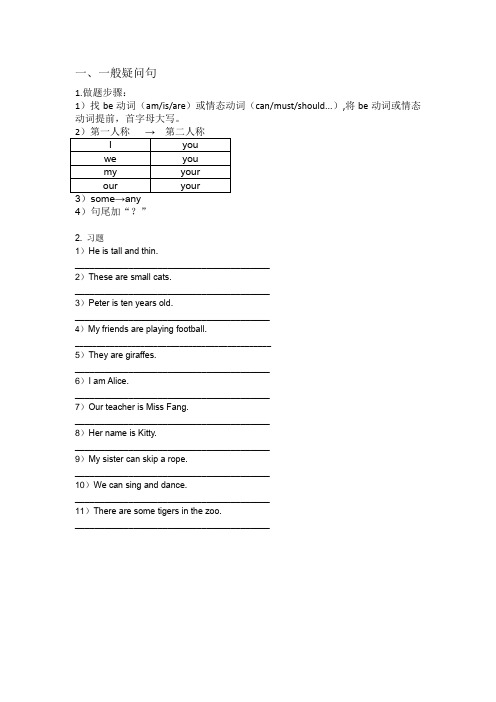
一、一般疑问句1.做题步骤:1)找be动词(am/is/are)或情态动词(can/must/should...),将be动词或情态动词提前,首字母大写。
4)句尾加“?”2. 习题1)He is tall and thin.________________________________________2)These are small cats.________________________________________3)Peter is ten years old.________________________________________4)My friends are playing football._____________________________________________5)They are giraffes.________________________________________6)I am Alice.________________________________________7)Our teacher is Miss Fang.________________________________________8)Her name is Kitty.________________________________________9)My sister can skip a rope.________________________________________10)We can sing and dance.________________________________________11)There are some tigers in the zoo.________________________________________二、一般疑问句的肯定回答/否定回答1. 主语一致1) Is he Tom?2) Are they good friends?3) Is it a panda?___________________ _____________________ ______________________ ___________________ _____________________ ______________________4) Is your sister a pupil? 5) Are Danny and Kitty friends? 6)Is the desk clean?___________________ _____________________ ______________________ ___________________ _____________________ ______________________注意①:问句用you,回答改用I或We1) Are you Jack?2) Are you Chinese?3) Are you policemen?___________________ _____________________ ______________________ ___________________ _____________________ ______________________注意②:问句用指示代词this/that或these/those,回答改用it或they(不管是人还是物) 1) Is this your T-shirt?2) Are those your coats? 3) Is that a dress?___________________ _____________________ ______________________ ___________________ _____________________ ______________________4) Is that your son? 5) Are these your toys? 6) Is this your daughter?___________________ _____________________ ______________________ ___________________ _____________________ ______________________注意 :若问句中this/that或these/those为限定词,则主语一致1) Is that man your father? 2) Are these peaches pink? 3) Is this girl your daughter? ___________________ _____________________ ______________________ ___________________ _____________________ ______________________三、否定句1.做题步骤1)在be动词后加not。
否定句及一般疑问句
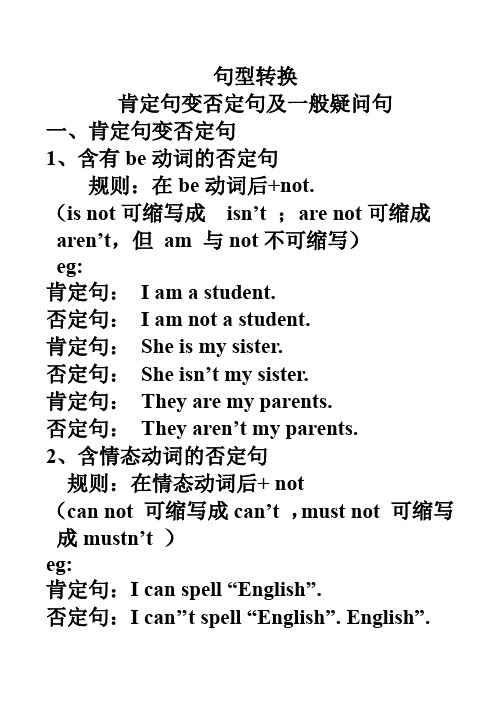
句型转换肯定句变否定句及一般疑问句一、肯定句变否定句1、含有be动词的否定句规则:在be动词后+not.(is not可缩写成isn’t ;are not可缩成aren’t,但am 与not不可缩写)eg:肯定句:I am a student.否定句:I am not a student.肯定句:She is my sister.否定句:She isn’t my sister.肯定句:They are my parents.否定句:They aren’t my parents.2、含情态动词的否定句规则:在情态动词后+ not(can not 可缩写成can’t ,must not 可缩写成mustn’t )eg:肯定句:I can spell “English”.否定句:I can’’t spell “English”.English”.肯定句:I must find it.否定句:I mustn’t find it.3、含有实义动词的句子的否定句构成(1)第三人称单数做主语。
(he、she、it或表示单个人或物的第三人称名词)规则:要在行为动词前加上助动词doesn’t,然后将动词恢复原形。
eg :肯定句:He has a soccer ball.否定句:He doesn’t have a soccer ball.(2)其它人称做主语规则:在行为动词前加don’t ,句子中的行为动词用原形。
eg:肯定句:They like bananas.否定句:They don’t like bananas.注:(1)在变否定句时,如遇some应变any Here are some books.Here aren’t any books.二、肯定句变一般疑问句1、含有be动词的句子变一般疑问句规则:把be动词提至句首,第一人称变第二人称,句末句号变问号。
(I/we变成youMy/our变成your)肯定句:I am a student.一般疑问句:Are you a student?肯定句:She is my sister.一般疑问句:Is she your sister?肯定句:They are my parents.一般疑问句:Are they your parents?2、含有情态动词的句子变一般疑问句规则:把情态动词提至句首,第一人称变第二人称,句末句号变问号。
小学英语四种基本句型-肯定句、否定句、一般疑问句与特殊疑问句
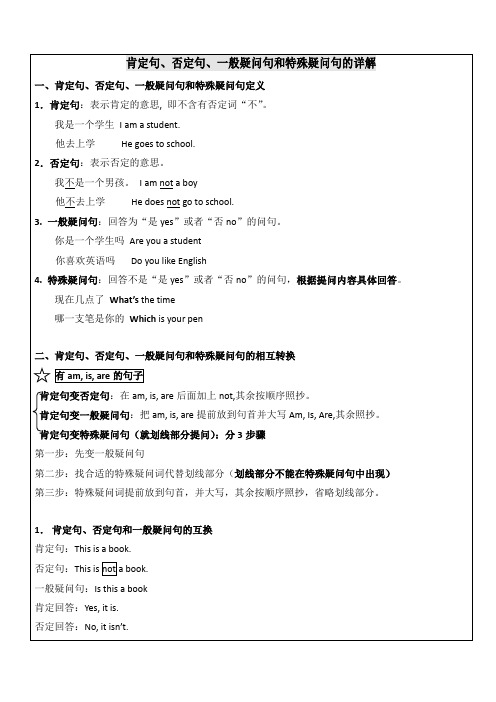
5、 Kick the ball to me! (改为否定句)
6、 I have a big present. (对划线部分提问)
7、 There are some orange trees on the farm. (改为单数句子)
练一练 3:
is this It’s a rubber.
_______ rubbers are there in the pencilbox
表示长度:It’s five hundred metres. How long is it
4、 颜色,东西
表示颜色:The shoes are white. What color are the shoes
表示物:They are white sheep. What are they
表示颜色:They are white sheep. What color are these sheep
类别 陈述句
疑问句
用法
标点
肯定 叙述一件事情或
说明说话人的看法
.
否定
一般 用于提出问题
特殊 用于提出问题
例句 This is a bag. That's my book. I can see a bag over there. I don't know. Are you a student Do you like puppets Can you speak English What's your name Where's my bag How many trees are there
_______ is your brother He’s nine.
are they They are cows.
一般疑问句和否定句以及全面的配套练习

一般疑问句和否定句以及全面的配套练习一、一般疑问句1. 概念:一般指用Yes 或No 回答的疑问句;2. 特点:一般翻译为“…吗?”,故回答用“是”或“不是”;3. 分类:①含有be 动词的陈述句变为一般疑问句;②含有实意动词的陈述句变为一般疑问句;③含有情态动词的陈述句变为一般疑问句;※4.具体分类学习:①含有be 动词的陈述句变为一般疑问句学习要点1:将be 动词提前;若主语是第一人称,要变为第二人称;其他句子成分位子不变;(your your)学习要点2:回答时的结构如下:Yes,人称代词 + be 动词. No,人称代词 + be not 缩写.其中,回答的人称代词和be 动词要和问句内容相一致;学习要点3:be 动词回答时用到的否定缩写积累:首先:am not 没有缩写, 否定回答缩写为:No, I’m not.其次:is not = isn’t are not = aren’t知识回顾:Be 动词用法口诀:”我”用am, “你”用are, is 连着“他、她、他、它”;单数用“is”,复数用“are”;例句分析:a.Is she a doctor?Yes, she is. / No, she isn’t.b.Are these his dictionaries?Yes, they are. / No, they aren’t.c.随堂练习1: This is her watch. ?. /.总结:当陈述句句子主语是this/that,回答用it 来指代之;当陈述句句子主语是these/those,回答用they 来指代之;随堂练习2:?. /.d.Is she your cousin?Yes, she is. / No, she isn’t.延伸学习:Be 动词的肯定陈述句变为否定陈述句要点:变为否定句,直接在be 动词后面加not;例句分析:Those are not their books.b.He is not my good friend.c.I am not a student.随堂练习:This is my ruler.否定句:.一般疑问句:? Yes,. / No,.小试牛刀:1.She is always a good student.(改为一般疑问句,作否定回答)一般疑问句:?Yes,. / No,.2.Daniel and Tommy(be) in Class One.3.There(be) some water in the bottle.4.I(be) ill. I’m staying in bed.5.What day(be) it today? It’s Saturday.②含有实意动词的陈述句变为一般疑问句;学习要点1:找助动词do / does 构成疑问和否定;学习要点2: 一般疑问句也要找do/does,放句首构成疑问;例句分析1:I have an apple. : 我有一个苹果。
英语肯定句,否定句,一般疑问句和特殊疑问句
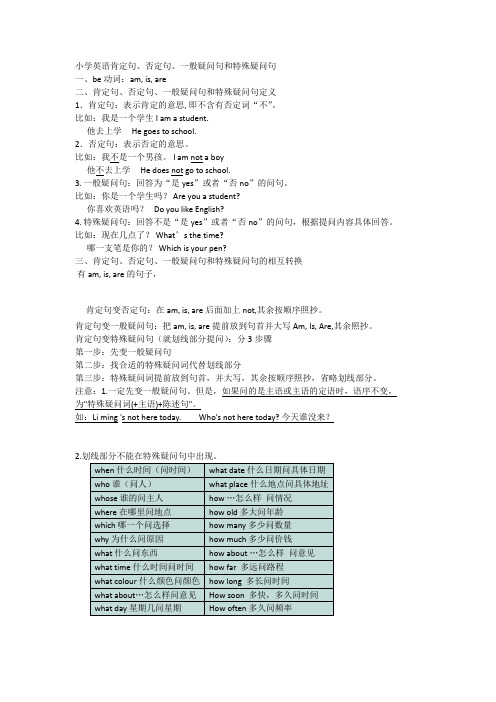
小学英语肯定句、否定句、一般疑问句和特殊疑问句一、be动词:am, is, are二、肯定句、否定句、一般疑问句和特殊疑问句定义1.肯定句:表示肯定的意思, 即不含有否定词“不”。
比如:我是一个学生 I am a student.他去上学 He goes to school.2.否定句:表示否定的意思。
比如:我不是一个男孩。
I am not a boy他不去上学 He does not go to school.3. 一般疑问句:回答为“是yes”或者“否no”的问句。
比如:你是一个学生吗? Are you a student?你喜欢英语吗? Do you like English?4. 特殊疑问句:回答不是“是yes”或者“否no”的问句,根据提问内容具体回答。
比如:现在几点了? What’s the time?哪一支笔是你的? Which is your pen?三、肯定句、否定句、一般疑问句和特殊疑问句的相互转换有am, is, are的句子,肯定句变否定句:在am, is, are后面加上not,其余按顺序照抄。
肯定句变一般疑问句:把am, is, are提前放到句首并大写Am, Is, Are,其余照抄。
肯定句变特殊疑问句(就划线部分提问):分3步骤第一步:先变一般疑问句第二步:找合适的特殊疑问词代替划线部分第三步:特殊疑问词提前放到句首,并大写,其余按顺序照抄,省略划线部分。
注意:1.一定先变一般疑问句。
但是,如果问的是主语或主语的定语时,语序不变,为"特殊疑问词(+主语)+陈述句"。
如:Li ming 's not here today.Who's not here today? 今天谁没来?2.例如:1.肯定句、否定句和一般疑问句的互换肯定句:This is a book.否定句:This is not a book.一般疑问句:Is this a book?肯定回答:Yes, it is.否定回答:No, it isn’t.2.就划线部分提问(变特殊疑问句)This is a book.第一步:变一般疑问句 Is this a book?第二步:找合适的特殊疑问词 Is this what ?第三步:特殊疑问词提前放到句首,并大写,其余按顺序照抄,省略划线部分。
一般疑问句与否定句语法

一般疑问句和否定句一般疑问句一般疑问句是疑问句的一种。
它是只用yes(是)或no(否)来回答的句子。
其结构是:be/助动词/情态动词+主语+其他成分。
第一人称变为第二人称。
通常回答为:肯定:Yes,主语+提问的be/助动词/情态动词.否定:No,主语+提问的be/助动词/情态动词的否定形式.1.先找be动词,置于句首,句末改成问号。
①It is a dog . (陈述句) Is it a dog ? Yes, it is. No,it isn’t.②They’re cakes. Are they cakes ? Yes, they are. No,they aren’t.③I’m a girl. Are you a girl ? Yes, I am. No, I’m not.2.没有be动词的情况。
①I like cars. (陈述句) Do you like cars ? Yes, I do. No, I don’t.②I have some apples. Do you have any apples? Yes, I do. No, I don’t.③I’d like some oranges. Would you like some oranges? Yes,please. No, thanks.④I can swim. Can you swim ? Yes, I can. No, I can’t.否定句①It is a dog . (陈述句) It isn’t a dog .②They’re cakes. They aren’t cakes.③I’m a girl. I’m not a girl.④I like cars. I don’t like cars.⑤I have some apples. I don’t have any apples.⑥I can swim. I can’t swim.习题1:1. It is my fridge . (改一般疑问句) _____________________________________2.They are our jackets. (改一般疑问句) _____________________________________3. They like mangoes. (改一般疑问句) _____________________________________4. I’d like some bananas. (改一般疑问句) _____________________________________5.We can skate. (改一般疑问句) _____________________________________习题2:①They are my skirts. (改否定句) _____________________________________②I like dolls. (改否定句) _____________________________________③It’s a cat. (改否定句) _____________________________________④You can skate . (改否定句) _____________________________________⑤We have some grapes. (改否定句) _____________________________________⑥I’m a boy. (改否定句) _____________________________________。
肯定句、否定句、 肯定句、否定句、一般疑问句和特殊疑问句的详解
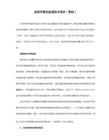
- 1、下载文档前请自行甄别文档内容的完整性,平台不提供额外的编辑、内容补充、找答案等附加服务。
- 2、"仅部分预览"的文档,不可在线预览部分如存在完整性等问题,可反馈申请退款(可完整预览的文档不适用该条件!)。
- 3、如文档侵犯您的权益,请联系客服反馈,我们会尽快为您处理(人工客服工作时间:9:00-18:30)。
一般疑问句,否定句课题一:一般疑问句general question重点:辨别一般疑问句,掌握一般疑问句语法结构和使用方法。
难点:1.一般疑问句的句子结构。
2.一般疑问句和陈述句之间的转化。
动词时态的变化。
教具准备:教学讲义练习题。
教学过程:1.复习:P17,P32重新朗读课文。
复习单词和语法。
2.提出课题:Does...like...(doing)?Yes,...does./No,...doesn’t.Is/Are...(doing)?Yes,...is/are./No,...isn’t/aren’t.由以上例句总结一下一般疑问句的定义:一般疑问句是疑问句的一种。
它是一般只用yes (是)或no(否)来回答的句子。
朗读一般疑问句时用升调。
3.教学步骤:a.举出更多例句.Eg1. 问句:Is this your pen?肯答:Yes,it is.否答:No,it isn`t.Eg2. 问句:Are these your books?肯答:Yes,they are.否答:No,they aren’t.Eg3. 问句:Can you speak English?肯答:Yes,I can.否答:No,I can’t.Eg4. 问句:Do you likeapple?肯答:Yes,I do.否答:No,I don’t.b.总结一下一般疑问的句子结构及回答。
(句子结构的记忆方法:就是讲前面2个词调换位置了。
)Is/Are+主语+其他部分? 。
是。
?Eg1. Is this your pen?当只有一支笔的时候就用Is, 回答:Yes,it is/No,it isn’t .当有两只及以上用时用Are,而且要讲这个(this)/那个(that)变为这些(these)/那些(those).笔要加s变成复数。
如:Are these/those your pens?回答:Yes,they are/No,they aren’t.② Can/Will+主语+V-原型? (后面动词都用原型)Eg. You can open the door→Can you open the door?You will go to school next Monday →Will you go to school next Monday ?③Do/Does+主语+V-原型?Eg. Do you likeapple?Does Mary like cat?第一,二人称(I,You)用Do; 第三人称(Mary)用DoesParents等复数也用Do.举例:我需要现在回家吗?Do i need to go home now?回答:你父母喜欢英语吗?Do your parents like English?Alice喜欢花吗?Does Alice like flower?C.辨别以下是否为一般疑问句。
Are you a student?Is it his pet?What is that over there?Can you swim?Do you have a storybook?This is a toy bear,I think.D.将陈述句转化为一般疑问句。
①句子中有Is/Are/can: (some 改成any,my改成your等)一加:把句中的Is/Are/can.到主语前;二改:改换主语称谓,即将句中的主语I\my\mine\we\our\ours等第一人称分别改为相应的第二人称you\your\ yours等;三问号:句末的句号改为问号。
如:Eg6. I am an English teacher. → Are you an English teacher?Eg7. We can speak English fluently. → Can you speak English fluently?②句子中没有Is/Are/can (some 改成any,my改成your等)一加:即在句首加助动词Do或Does;二改:1、把谓语动词改为原形;2、改换主语称谓(同①);三问号:句末的句号改为问号。
Eg8. We read English every morning. → Do you read English every morning?Eg9. Tom’s father listens to English on the radio every evening. →Does Tom’s father listen to English on the radio every evening?特别注意:对于第②一定要注意动词的还原,因为时态与数的变化已经体现在助动词上了。
E.将下面的句子转换为一般疑问句。
1.I am from china. Are you from china?2.This is my sister ,Nancy. Is this your sister,Nancy?3.You can have a look. Can I have a look?4.I play football. Do you play football?5.Kitty has a yellow purse. Does Kitty have a yellow Purse?6.There is a birthday cake on the table? Is there a birthday cake on the table?课题二:一般现在时否定句重点:1.掌握一般现在时否定句的基本构成方法。
2.了解一般现在时否定句的基本用法。
3.能灵活的运用一般现在时的否定句形式。
难点: 1.一般现在时否定句的构成,掌握行为动词一般现在时第三人称单数。
2.能灵活的运用一般现在时否定句。
教学过程:1.Be动词的否定式:be+notEg:I am a teacher. I ‘m not a teacher.You are a student. You aren’t a student.She is a doctor. She isn’t a docor.We are friends. We aren’t friends..要求学生写出类似的句子。
如:I am a girl.2.Do/Does(实义动词)的否定句。
Do+not/Does+not.第一人称(我/我们)、第二人称(你/你们)→Do第三人称(他/他们)→Does 改为否定句时,一定要记得讲句子中动词恢复原型。
Eg. I like English I don’t like English.Mary likes playing the piano Mary doesn’t like playing the piano.注意:球类前一般都不加定冠词.play football踢足球play baseball打棒球play tennis 打网球play table tenneis 打乒乓球Play badminton 打羽毛球乐器前一般都加定冠词.play the guitar 弹吉他play the violin 拉小提琴Play the drum 打鼓We go to school by bike. We don't go to school by bike.3.练习一下。
将词组或单词写成一个完整的句子,并改为否定句。
My mother read books every morning.Lily sing song every nightPlay basketball Tom like on weekendsAt the mid-aurumn eat we mooncakes课结束前总结课堂讲义1.否定句:将词组或单词写成一个完整的句子,并改为否定句。
My mother read books every morning.Lily sing song every nightPlay basketball Tom like on weekendsAt the mid-aurumn eat we mooncakes2.一般疑问句:辨别以下是否为一般疑问句。
Are you a student?Is it his pet?What is that over there?Can you swim?Do you have a storybook?This is a toy bear,I think.3.一般疑问句:将下面的句子转换为一般疑问句。
1.I am from china. Are you from china?2.This is my sister ,Nancy. Is this your sister,Nancy?3.You can have a look. Can I have a look?4.I play football. Do you play football?5.Kitty has a yellow purse. Does Kitty have a yellow Purse?6.There is a birthday cake on the table? Is there a birthday cake on the table?HOMEWORK一般疑问句及否定句专项练习一. 请将下列句子改为一般疑问句,并作出回答。
1. I am a student. ----- ------- a student?2.She is a girl. - ---- ----- a girl?3.His first name is Tom. ------ -------- ------name Tom?4. This is a ruler. ------ ------ a ruler?6. There is a book on the desk. ------ ------- a book on the desk?7.There are some dictionaries on the floor.----- ------- ------ dictionaries on the floor?10. My friend wants to know about my morning.----- ----- ------ ------- to know about------ morning?11.Tony has a computer. ----- Tony------ a computer?12.Mr.White is very busy. ------- Mr.White very busy?13.He teaches us art. ------ ------ --------- us art?14.She watches TV in the morning. ------ ---- ------- TV in the morning?15.I watch TV in the evening. ----- ------ ------- TV in the evening?16.He runs every day. ------- ------ -------- every day?17.I want to know his name. ------ ------- ------- to know his name?18.They study at home. ----- ------- -------- at home?19.She studies English at school. ----- ------- -------- English at school?20.I do my homework every day. ----- ------- ------ ------- homework every day?21.He does his homework at7:00pm. ----- ------ ------ his homework at7:00pm?22.They have five rooms. ------ ------- -------- five rooms?23.She eats chicken for dinner. ------ ----- ------ chicken for dinner?24.My parents like eating bananas. ----- ------- parents------ --------bananas?25. We do eye exercises every day. ----- ------ ----- eye exercises every day?26. He has a green T-shirt. ------ ----- ------- a green T-shirt?27.My birthday is October 10th. ---- ------ -------- October 10th?28.Her favorite subject is science. ----- ----- ------ ------ science?29.We can see some birds. ------- -------see------- birds?二.请将下列句子改为否定句1.There is a computer on the desk. There ------- a computer on the desk.2. There are some pictures on the wall. There ------- ------- pictures on the wall.3.She is seven years old. She ----- ----- seven years old.4. I like pears. I ----- ----- pears.5. She has a soccer ball. She ----- ------ a soccer ball.6. My mother wants to go to a movie. My mother------ ------ to go to a movie.7. Tom can play the drums. Tom------- play the drums.8. I can sing and dance. I ------- sing----- dance.9. She has some erasers. She------ ------ ----- erasers.10.I think it is interesting. I---- ----- it is interesting.11. Mary often plays sports after dinner. Mary----- ----- ----- sports after dinner.12. There are some tomatoes in the box.There are------- ------- tomatoes in the box.13. Tell him the news. ----- ------- him the news.14. She has brothers and sisters. She----- ------ brothers----- sisters.15. I think she is right. I----- ----- she----- right.16.She gets up at 6:00 in the morning. She----- ----- up at 6:00 in the morning.。
